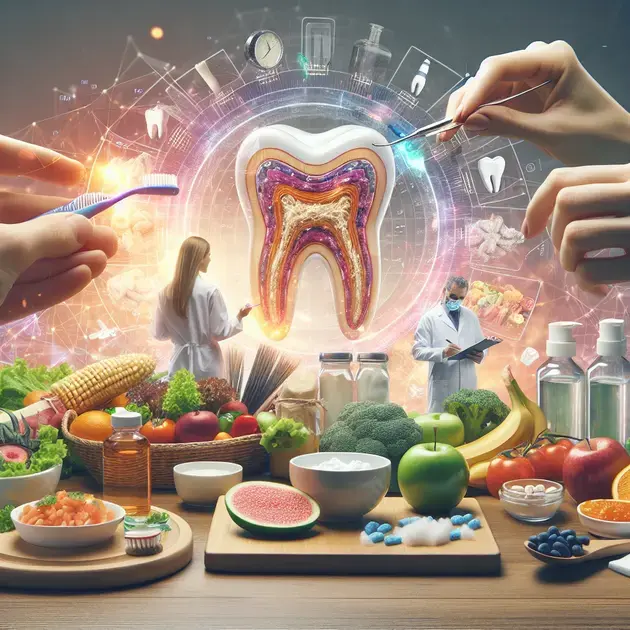Maintaining healthy gums is crucial for overall oral health. Proper oral hygiene practices can prevent gum diseases such as gingivitis and periodontitis. Regular dental check-ups and cleanings are essential to ensure that your gums stay healthy and free from infections.
One of the key tips for maintaining healthy gums is to brush your teeth at least twice a day with a fluoride toothpaste. Additionally, flossing daily helps to remove plaque and food particles that can lead to gum inflammation. A balanced diet rich in vitamins and minerals also contributes to gum health by supporting the immune system and reducing the risk of gum disease.

Proper Brushing Techniques for Healthy Gums
Proper brushing techniques are essential for maintaining healthy gums. The first step is to choose a soft-bristled toothbrush and fluoride toothpaste. Start by placing the toothbrush at a 45-degree angle to the gums and gently brush back and forth in short strokes. Be sure to brush the outer, inner, and chewing surfaces of all teeth. Don’t forget to brush your tongue to remove bacteria and freshen your breath.
For a more thorough clean, consider using an electric toothbrush. These devices have built-in timers to ensure you brush for the recommended two minutes. Additionally, some electric toothbrushes connect to apps on your smartphone to track your brushing habits and provide feedback on areas you may be missing.
To ensure you’re brushing for the right amount of time, consider using the “Brush DJ” app. This app plays music from your device while you brush, with each track lasting two minutes – the perfect amount of time for effective brushing.
Proper brushing techniques, when done consistently, can help prevent gum disease and keep your smile healthy and bright. Remember to replace your toothbrush every three to four months or sooner if the bristles appear frayed.
For more information on proper brushing techniques and gum health, visit the American Dental Association’s website for valuable resources and tips.
The Importance of Daily Flossing
Daily flossing is crucial for maintaining healthy gums and preventing gum disease. To start, cut a piece of floss about 18 inches long and wrap the ends around your fingers, leaving about 1-2 inches in between for maneuvering. Gently glide the floss between your teeth using a back-and-forth motion, making sure to curve around each tooth in a C shape to reach below the gumline.
If you struggle with traditional floss, consider using a water flosser like the Waterpik. This device uses a stream of water to remove plaque and debris between teeth and below the gumline. Water flossers are especially beneficial for those with braces or bridges who may have difficulty using traditional floss.
To ensure you floss daily, make it a part of your bedtime routine or set a reminder on your phone using the “Reminders” app. This will help establish the habit and ensure you don’t forget this important step in your oral care routine.
Remember, flossing helps remove plaque and bacteria from areas that your toothbrush can’t reach, reducing the risk of gum disease and cavities. Make sure to floss gently to avoid damaging your gums and consult your dentist for personalized flossing recommendations.
For more tips on effective flossing techniques and gum health, visit the American Academy of Periodontology’s website for valuable information and resources.
Benefits of a Balanced Diet for Gum Health
Eating a balanced diet is not only important for your overall health but also plays a significant role in maintaining healthy gums. Include plenty of fruits and vegetables in your diet, as they are high in vitamins and minerals that promote gum health. Foods rich in vitamin C, such as oranges and strawberries, can help prevent gum disease by boosting collagen production.
Incorporate calcium-rich foods like dairy products and leafy greens into your diet to support strong teeth and gums. Calcium is essential for maintaining the integrity of your jawbone and preventing tooth loss. Additionally, foods high in omega-3 fatty acids, like salmon and walnuts, have anti-inflammatory properties that can reduce the risk of gum disease.
To track your daily nutrient intake and ensure you’re getting the essential vitamins and minerals for gum health, consider using the “MyFitnessPal” app. This app allows you to log your meals and snacks, providing a breakdown of your nutrient intake and highlighting areas where you may be lacking.
Limiting sugary and acidic foods is also important for gum health, as these can contribute to decay and gum inflammation. Drink plenty of water throughout the day to keep your mouth hydrated and wash away food particles that can lead to plaque buildup.
By maintaining a balanced diet rich in essential nutrients and vitamins, you can support gum health, reduce inflammation, and lower your risk of gum disease. Consult with a nutritionist or dietitian for personalized dietary recommendations that promote overall oral health.

Healthy Habits for Gum Care
When it comes to maintaining healthy gums, there are several habits that can make a big difference in your oral health. One of the most important habits is brushing your teeth at least twice a day with a fluoride toothpaste. This helps to remove plaque and food particles that can lead to gum disease. It is also essential to floss daily to clean between the teeth and along the gumline.
In addition to regular brushing and flossing, it is important to have regular dental check-ups. This allows your dentist to monitor your gum health and catch any issues early. Eating a balanced diet and avoiding sugary snacks can also help keep your gums healthy.
Another important habit for gum care is to avoid smoking and limit alcohol consumption. Smoking can increase the risk of gum disease, while alcohol can dry out the mouth and contribute to gum problems. Drinking plenty of water and staying hydrated is also beneficial for gum health.
Regular exercise can also play a role in gum care, as it helps improve circulation and overall health. Finally, managing stress through relaxation techniques or mindfulness practices can contribute to healthier gums, as stress has been linked to an increased risk of gum disease.
Understanding the Role of Regular Dental Check-ups
Regular dental check-ups are essential for maintaining good gum health. During a dental check-up, your dentist will examine your gums for any signs of disease or inflammation. They will also clean your teeth to remove plaque and tartar buildup, which can contribute to gum problems if left untreated.
Furthermore, regular dental check-ups allow your dentist to detect any issues early, such as cavities or gum disease. This early intervention can prevent more serious problems in the future and save you from more extensive and expensive dental treatments.
In addition to examining your gums, dental check-ups also include screenings for oral cancer and other oral health issues. Your dentist can provide personalized recommendations for improving your oral hygiene routine and addressing any specific concerns you may have about your gum health.
Overall, regular dental check-ups are a crucial part of preventive care and can help you maintain healthy gums and teeth for a lifetime.
Effective Home Remedies for Gum Health
In addition to regular dental check-ups, there are several effective home remedies that can help promote gum health. One of the simplest home remedies is saltwater rinses, which can help reduce inflammation and kill bacteria in the mouth. Simply mix warm water with a teaspoon of salt and swish it around your mouth for about 30 seconds.
Another home remedy for gum health is oil pulling, which involves swishing coconut oil or sesame oil in your mouth for about 15-20 minutes. This practice can help remove toxins and bacteria from the mouth, promoting healthier gums and fresher breath.
Using herbal mouthwashes with ingredients like tea tree oil or sage can also be beneficial for gum health. These natural ingredients have antimicrobial properties that can help reduce inflammation and fight off bacteria in the mouth.
Regularly consuming foods rich in vitamin C, such as citrus fruits and leafy greens, can help support gum health by promoting collagen production and reducing inflammation. Lastly, practicing good oral hygiene habits like brushing and flossing regularly is key to maintaining healthy gums at home.
**
Conclusion
**
Healthy gums are crucial for overall oral health, and cultivating good habits can significantly impact gum care. Brushing teeth at least twice a day with fluoride toothpaste helps remove plaque and food particles, preventing gum disease. Combining this with daily flossing to clean between teeth and along the gumline is essential for optimal gum health.
Regular dental check-ups play a vital role in maintaining healthy gums by allowing early detection of any issues, such as inflammation or gum disease. Dentists can provide personalized recommendations and preventive care during these check-ups, ensuring long-term gum health. Additionally, screenings for oral cancer further emphasize the importance of regular dental visits.
Home remedies are also effective in promoting gum health. Saltwater rinses and oil pulling help reduce inflammation and kill bacteria, while herbal mouthwashes with antimicrobial properties combat bacteria in the mouth. Consuming vitamin C-rich foods and practicing good oral hygiene habits are simple yet powerful ways to support gum health at home.
